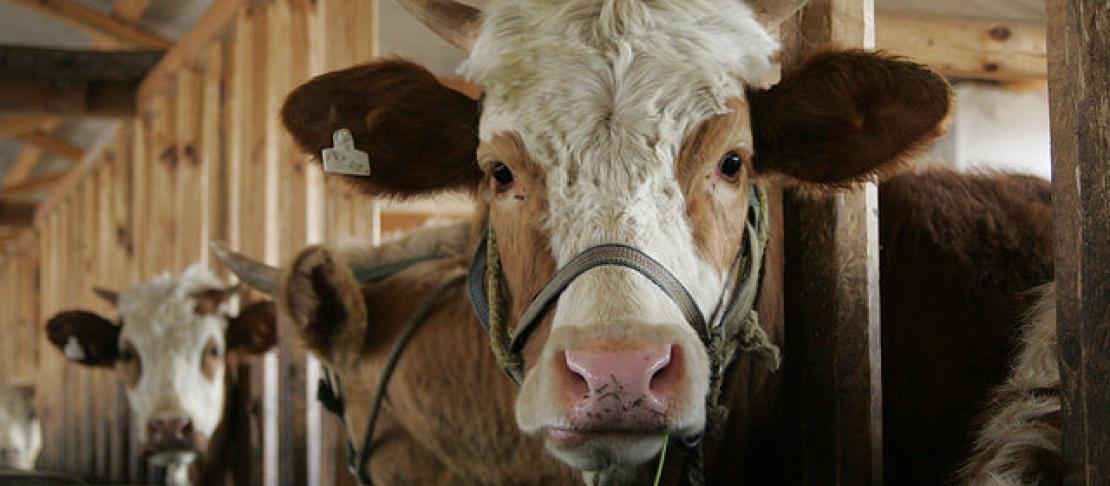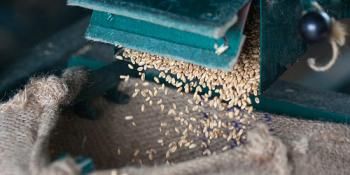China takes action on climate change in agriculture

China launches two major research projects in support of private and public sector efforts to mitigate greenhouse gas emissions from livestock.
Already the largest livestock producer in the world, China’s livestock sector is booming. And so are emissions: national methane emissions from livestock have increased since 1980.
Policy-makers in China are increasingly concerned with curbing the environmental impacts of livestock, including climate change, and thus have set an ambitious target to reduce carbon dioxide emissions per unit of gross domestic product (GDP) by 18%.
With this goal, Chinese researchers, government officials and companies are working with the CGIAR Research Program on Climate Change, Agriculture and Food Security (CCAFS), the Sino-Dutch Dairy Development Centre (SDDDC), Wageningen University & Research (WUR) and the Global Research Alliance on Agricultural Greenhouse Gases (GRA) to improve:
- tracking emissions from livestock, and
- assessment of climate impacts of improved livestock management practices.
Two research efforts are being developed: advanced emission accounting methods (Tier 2) that will enable provincial governments to contribute high quality data to national reports, and a tool that can assess emissions from improved livestock practices at the dairy farm level.
Research to improve emissions accounting
Professor Dong Hongmin, Deputy Director General of the Institute for Agriculture, Environment and Sustainable Development (IEDA) at the Chinese Academy of Agricultural Science (CAAS), convened a kick-off event on 12 October for the development of guidance on implementing improved emission accounting methods at the province level.
The project will focus on a major livestock-producing province and important livestock categories: enteric fermentation and manure management from dairy cattle and manure management from pigs. The project will develop a guideline based on Tier 2 methods to improve measurement, reporting and verification (MRV) of greenhouse gas emissions; survey practices in different provinces; analyze MRV data sources in 3-5 provinces; and test the new guidance for implementation in Hebei Province.”
Dong Hongmin, IEDA, CAAS
More than 30 participants attended the information-packed event to improve MRV, including company representatives, government officials from the Ministry of Agriculture and Rural Development and the Ministry of Environment, the research team from CAAS and Hebei Livestock Station, and CCAFS scientists.
Research to reduce climate impacts from dairy
Following closely on the heels of the MRV event, Professors Li Shengli (China Agricultural University - CAU), Dong Hongmin, and Kees De Koning from WUR joined representatives from the SDDDC to launch a three-year public-private sector collaboration. The collaboration among Chinese and Dutch research institutions, CCAFS and the private sector will identify sustainable dairy practices, especially from novel feeds, and provide accurate estimates of emissions and emission reductions from changes in dairy practices.
The expectation is that global best practices and feed innovations, such as lignin degradation of maize or rice straw, will help reduce emissions from dairy.
Kees de Koning, Chairman of the SDDDC Steering Committee, welcomed this collaboration:
Sustainability in the Chinese dairy sector is seen as an important direction for the coming years and this cooperation between CCAFS, CAAS, CAU, WUR, and SDDDC is an important milestone."
Kees de Koning, SDDDC, WUR
International cooperation
CCAFS expanded collaboration with WUR and other Dutch agencies in 2017, when CCAFS moved its global program management unit to WUR. Building upon strong research and engagement with public and private sector agriculture, the partnership aims to achieve ambitious goals in poverty reduction, zero hunger and climate action.
For CCAFS, this is the first major collaboration with Chinese partners, said Lini Wollenberg, Low Emissions Development Leader at CCAFS and Professor, University of Vermont:
China’s commitment to reducing emissions, the scale of the potential impacts and the entrepreneurism of the livestock producers are a promising combination. This is research that will really matter for the globe’s climate."
Lini Wollenberg, CCAFS and University of Vermont
Read more:
- Presentation: Dong Hongmin. Tier II MRV of livestock emissions in China: Developing guidance for implementation at the provincial level. October 12
- Presentation: Dong Hongmin. Carbon footprint assessment and mitigation options of dairy under Chinese conditions - Implementation plan. October 16
- Presentation: Kees de Koning and Marion de Vries. Carbon footprint assessment and mitigation options of dairy under Chinese conditions. October 16
- Presentation: Lini Wollenberg. Overview of CCAFS and impact of dairy on climate in China. October 16
- Report: Measurement, reporting and verification of livestock GHG emissions by developing countries in the UNFCCC: current practices and opportunities for improvement
- Project webpage: Sustainable Intensification of Dairy Production Indonesia (SIDPI)
- Project webpage: Mitigation in livestock and low emissions development pathways in East Africa
Julianna White is Program Manager and Communications Specialist for CCAFS Low Emissions Development. She is based at the University of Vermont.


